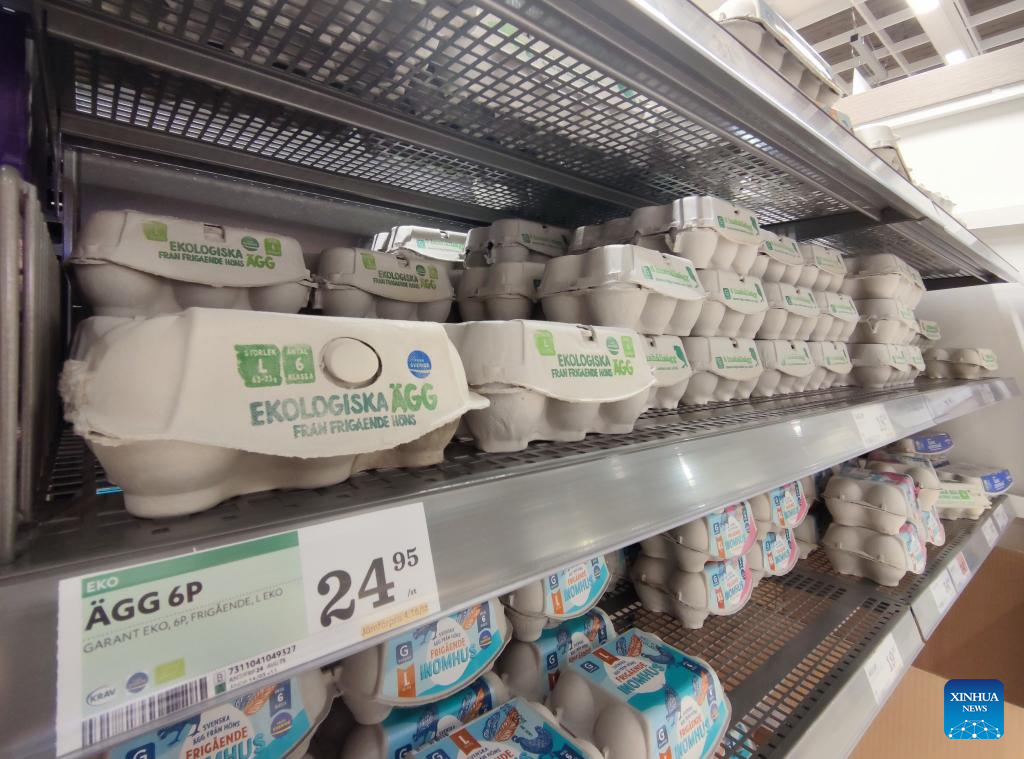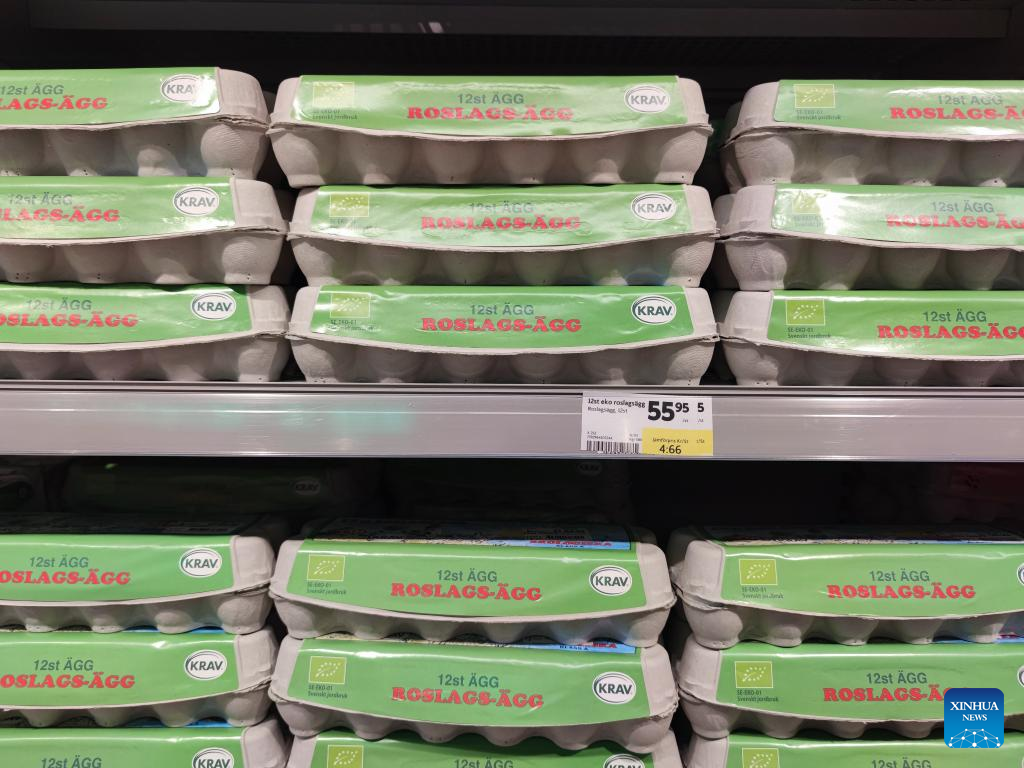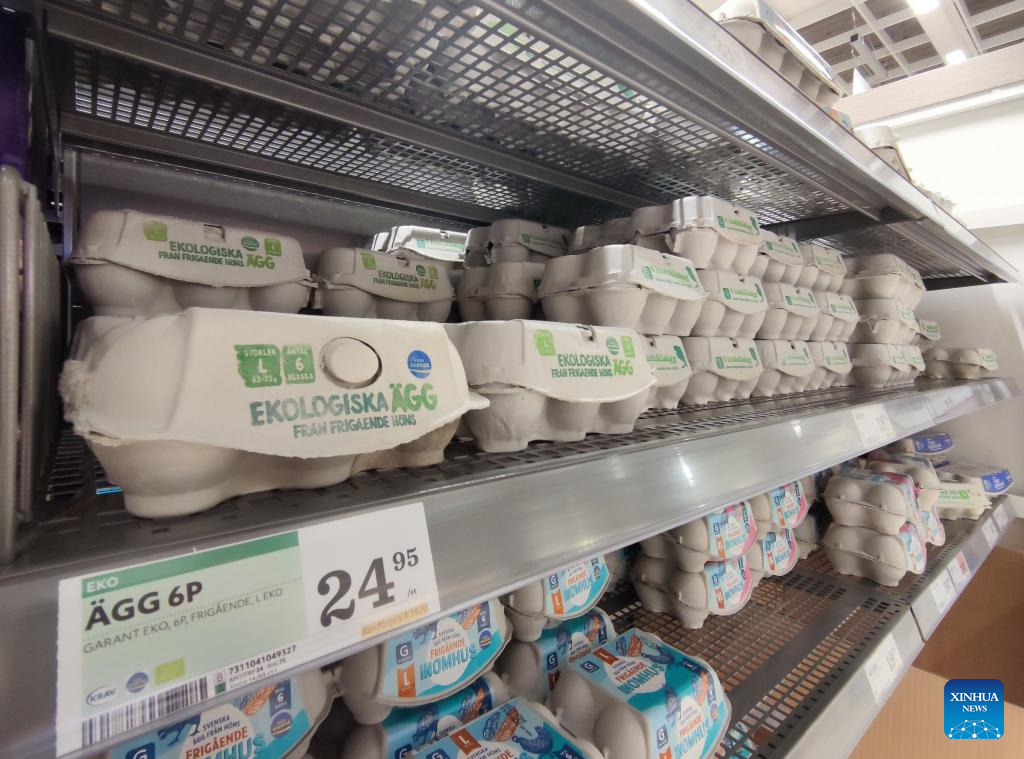Source: Xinhua

Photo taken on April 13, 2022 shows eggs on the shelf at a supermarket in Stockholm, Sweden. (Photo by Wei Xuechao/Xinhua)
by Fu Yiming, He Miao and Patrick Ekstrand
STOCKHOLM, May 8 (Xinhua) — For Johan Wellander, a Swedish egg producer, the rocketing cost of feeding his laying hens has made the situation unsustainable, thanks to the inflation accelerated by the ongoing Ukraine crisis and the western sanctions against Russia.
The Russia-Ukraine conflict has stricken commodity markets and caused a ripple effect globally. Sweden’s egg industry is the latest to bear the brunt, as it is highly dependent on grain to feed livestock — and this against the backdrop of ever more higher costs for fuel.
“SITUATION IS URGENT”
Standing among feed silos and farm buildings housing more than 90,000 laying hens, Wellander described a dire picture to Xinhua: Egg farmers in Sweden are struggling to make ends meet, as they are caught in between the hiking costs of egg production and capped retail prices.
“The situation is urgent and unless the egg price increases, we will have to phase out our business,” Wellander said at the poultry farm, which he runs with his brother in an agrarian flatland outside the city of Orebro, some 160 km west of the Swedish capital of Stockholm.
His worries echoed that of Leif Denneberg, who is chairman of the board at Svenska Agg, the trade association of the Swedish egg industry.
The price of feed has lately doubled, and the fact that the price of eggs in stores does not move at the same rate will be devastating to the country’s egg industry, Denneberg told local newspaper Aftonbladet.
If an average egg costs 2.5 Swedish crowns (0.25 U.S. dollars), 0.80 crown of it is the cost for farmers. But today, all of this 0.80 crown is used to buy feed, Denneberg explained.
For Wellander, the nightmare does not end here, as egg production is a business with long lead times.
“We will have new laying hens delivered in a few weeks at a cost of around 1 million crowns, but given the current situation with the spiraling cost of feed, fuel and electricity, the most economical thing to do would be to pay the invoice without receiving the hens,” he said.
“Then we would ‘only’ lose 1 million crowns instead of 2 million if we put the hens into production.”
BURDEN ON CONSUMERS
Coinciding with the price-setting negotiations among major stakeholders, several major egg producers have announced their intention to raise their prices “sharply.”
But such a price rise on eggs, an essential staple food, would inevitably burden consumers, who already struggle with inflation in all aspects of their lives.
To make matters worse, the increasing cost of food is compounded in Sweden by the surging price of plastics, which are widely used to package food.
The soft plastic material polyethylene, in particular, is getting more expensive. The spike can be attributed to the rising costs of energy and oil, and of certain additives used in plastic production sourced from Russia, from where imports have been stopped.
Andreas Malmberg, chief executive officer (CEO) of plastic manufacturer Trioworld, told Swedish Television that consumers would have to “pay more for everything” they purchase.
Many Swedes share Malmberg’s view that inflation will be persistent.
“Shopping for groceries is becoming increasingly expensive, especially if you have three children — including two teenagers — to feed,” Fredrik Sandberg, a father of three living in the Swedish capital, told Xinhua.
The increasing energy costs and the interest hike have made Sandberg worried for the future, who is aware that many others are considerably worse off.
“Although I am prepared to pay more for food, there is a limit and we may end up having to buy cheaper items to cope financially,” Sandberg said.
“Unfortunately, many, especially low-income single parents, have already been forced to do so and nobody knows when this spiraling inflation will end.” (1 Swedish crown = 0.1 U.S. dollars) ■

Photo taken on April 14, 2022 shows eggs on the shelf at a supermarket in Stockholm, Sweden. (Photo by Wei Xuechao/Xinhua)


